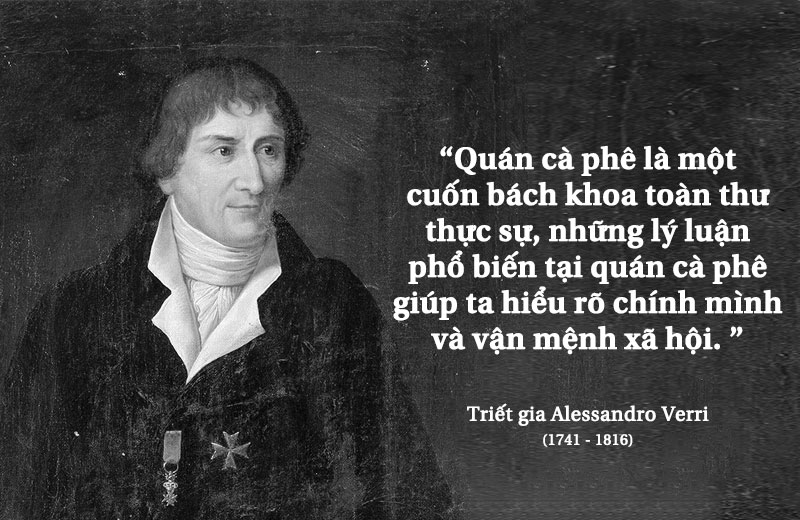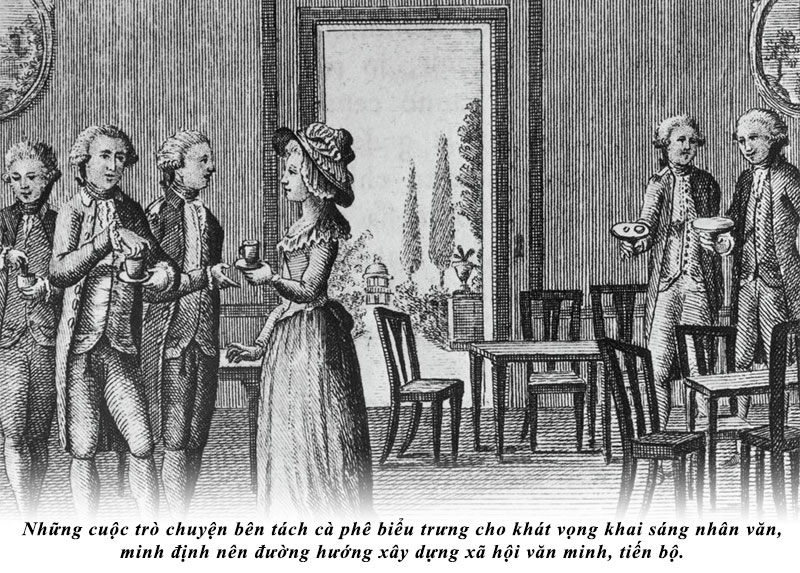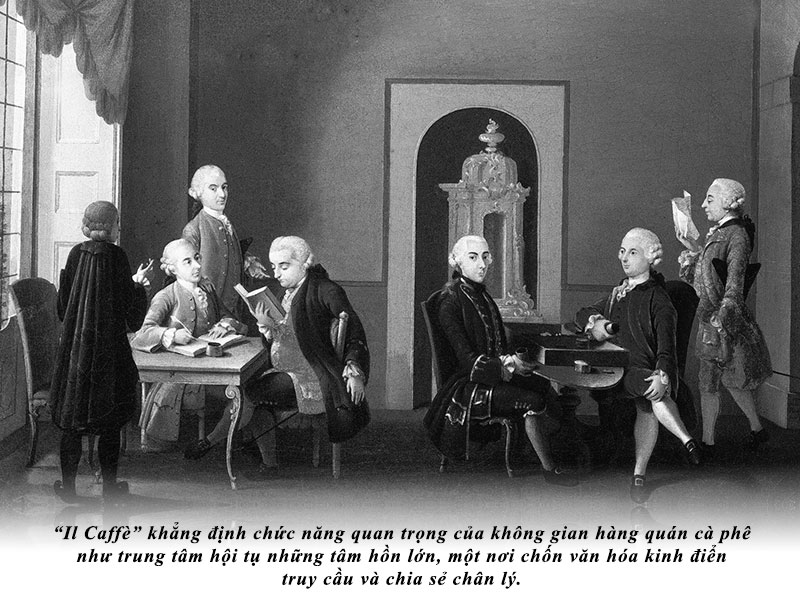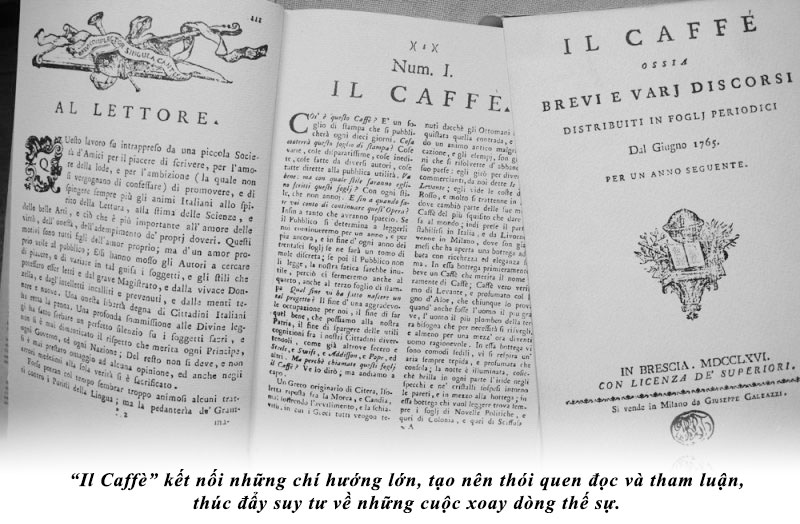Article 26: Il Caffè – discourse of the enlightened intelligentsia
In the middle of the Enlightenment era, intellectuals recognized that the pursuit and sharing of knowledge was the foundation for changing the destiny of each person, each people, and each nation. Thoughts initiated over a cup of coffee become an important catalyst in the process of transforming public thinking.

“The coffee shop is a true encyclopedia, those theories that become popular at the coffee shop help us understand ourselves and the destiny of the society.” Philosopher Alessandro Verri (1741-1816)
Coffee shop – the space for indomitable free spirits
In the 17th century, when Europe fell into a crisis of consciousness (La Crise de la conscience européenne), people lost their way and confidence in the future that theocratic institutions and the power had promised. The Enlightenment movement was initiated, characterized by the will to fight for the truth, thinking and taking action to change lives. The liberal thought germinating in this era was the source of impulse to initiate great innovations, promoted the industrial revolution, and created a solid premise for the development of all fields from culture, science, technology to economy, politics… leading to a radical change in the face of Europe and the whole Western world.

The conversation over a cup of coffee symbolized the desire to enlighten humanity and defined the direction of building a civilized and progressive society.
In Italy, due to its national character, the Enlightenment movement also had a different nuance. At the end of the 17th century, the Italian territory was still divided and under the domination of Spain, Austria, France… The mission of the Renaissance movement was not completed. The Enlightenment movement in Italy had to not only pave the way for scientific, technical and cultural innovation, but also continue the achievements made in the Renaissance, and at the same time realize the aspiration for national unification under the same Italian identity.
However, in the feudal context, freedom of speech was strictly controlled by lords and high priests. The erudite intelligentsia moved between France, England, Germany… looking for ways to break down barriers so that ordinary people could also access knowledge. And they found the answer in the coffee shop.
The cafe since its inception in the Ottoman Empire had served as a place for knowledge exchange and was known as “Mekteb-i ‘irfan” – a school that provides and disseminates new ideas. When introduced to Europe, coffee shops continued to be a space to discuss topical issues and innovate ideas. It can be said that in the Enlightenment era, coffee shops were a special space, overcoming all oppression and contradictions to forge the spirit of freedom. Different perspectives and fields of knowledge were disseminated in the cafe, even initiating great reforms, defining the direction of building a civilized and progressive society. Therefore, the conversations over the cup of coffee became a symbol of the aspiration for human enlightenment, and the coffee shop was the convergence of the indomitable free spirits.
For example, Caffè Florian in Venice, Antico Caffè Greco in Rome, Caffè Tommaseo and Antico Caffè San Marco in Trieste, Caffè San Carlo and Caffè Torino in Turin, Gran Caffe Gambrinus in Naples… are all historic cafes, where intellectuals gathered in all fields, promoting liberal ideas, played a key role in the process of national unification, turning the destiny of Italy.
“Il Caffè” – knowledge base formed over a cup of coffee
At the core of the Enlightenment movement was knowledge. The great souls of the times carried the indomitable spirit of freedom, recognized the truth, and courageously used freedom at its fullest – the right to openly use one’s own intellect to lead the public to apply knowledge for social transformation, towards a progressive lifestyle. The need to seek and share the truth and knowledge therefore became even more urgent.

“Il Caffè” affirms the important function of the coffee space as a center for great souls, a place where classical culture seeks and shares the truth.
In England – the first nation to start the Enlightenment movement, intellectuals jointly founded the magazines “The Tatler” (1709) and “The Spectator” (1711) which simulated conversations in the coffee shop, expressing the desire to transform a way of life with virtue and wisdom. The French intellectuals gathered at Café Procope to write the “Encyclopédie” – an encyclopedia spreading human knowledge.
From that inspiration, in 1764, the great philosophers Pietro Verri, Alessandro Verri, Cesare Beccaria, Alfonso Longo, Pietro Secchi… belonging to a group of enlightened Italian intellectuals founded the magazine “Il Caffè” to build an intellectual foundation for the community through the ideas formed over a cup of coffee.
In the introduction to the magazine “Il Caffè”, philosopher Pietro Verri (1728 – 1797) – editor of the magazine, cited the long history and influence of coffee on both Eastern and Western societies to conclude “Coffee regenerates the soul, awakens the mind and is especially useful for thinkers and scientific researchers”. From that perspective, the mission of “Il Caffè” was to provide knowledge in a creative spirit like the characteristics of coffee. It could be understood as disseminating theoretical cognitive foundations and thinking directions in order to awaken each person’s duty in the whole process of participating in the search for solutions to social problems.

“Il Caffè” connected major directions, created reading and discussion habits, and promoted reflection on the twists and turns of the world.
Thus, essays published in “Il Caffè” magazine simulating a conversation over a cup of coffee were an excuse to stimulate desire, giving rise to actions that would transform human issues such as lifestyle, culture, economic, political … towards a more civilized and happier life.
The magazine “Il Caffè” was the discourse of the enlightened intellectuals, representing the civilized thought leading the ideal of the times. From the influence of “Il Caffè”, the Enlightenment spread from Milan to Venice, Naples, Florence and all of Italy. In particular, the national spirit propagated by “Il Caffè” strongly rekindled the desire to unify the Italian nation, each individual clearly realized his or her responsibility in the common destiny of the country. From here arised the will to unite, break down the cultural differences between the regions that were divided, and unify the nation under a common identity. Cultural unity was an important factor leading to the perfection of Italian territory as it is today.
THE REAL COFFEE
ROASTED ONLY FOR PEOPLE OF WISDOM!
Source: “The Philosophical Way of Coffee” – copyright by Trung Nguyen Legend


